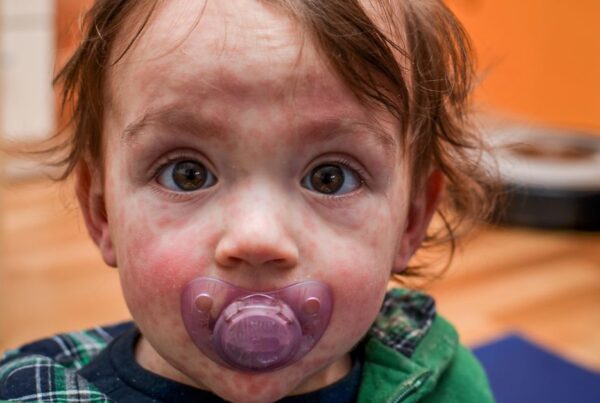Postpartum depression (PPD) is a significant mental health concern that affects about 1 in 7 new mothers in the US, or roughly 10-15% (1). While the postpartum period is often portrayed as a joyful time, it can also be a period of intense emotional turmoil for some parents. This clash in what we expected to feel versus what we actually feel can make postpartum depression feel even more jarring.
This article shares information on maternal postpartum depression, including its symptoms, risk factors, and management options to help expecting and new mothers gain an understanding of this condition.
What Is Postpartum Depression?
Postpartum depression is a type of depressive disorder that occurs after the arrival of a new baby. It is often thought that postpartum depression can only occur in mothers who have given birth, but it is possible for parents of all situations (including dads and adoptive parents) to experience postpartum depression (2,3).
Postpartum depression is characterized by a range of emotional, physical, and behavioral changes that disrupt a parent’s ability to function normally (4). Unlike the “baby blues,” which are brief and mild mood swings, postpartum depression is more severe and can last for months if untreated.
To learn more about Paternal Postpartum Depression, see Postpartum Depression In Dads.
Symptoms of Postpartum Depression
Symptoms of postpartum depression can vary but generally include a range of emotional, physical, and cognitive changes that impact daily functioning and sometimes the ability to care for a newborn (4). It is important that both the mother and her support system are able to recognize symptoms early as this allows for seeking timely help and support.
Emotional Symptoms
- Persistent sadness
- Feelings of worthlessness, guilt, or shame
- Anxiety or panic attacks
- Irritability, anger, or rage
- Lack of interest in the baby, family, or activities previously enjoyed
Physical Symptoms
- Chronic fatigue or exhaustion
- Sleep disturbances (insomnia or excessive sleeping)
- Changes in appetite (overeating or loss of appetite)
- Physical aches and pains without a clear cause
Cognitive Symptoms
- Difficulty concentrating, remembering details, or making decisions
- Intrusive thoughts about harming oneself or the baby
- Fear of being left alone with the baby
A Note on Postpartum Psychosis
Postpartum depression is not to be confused with postpartum psychosis, which is a psychiatric emergency characterized by acute onset of manic or depressive psychosis within the first few days or weeks after delivery and has a potential suicide and infanticidal risk. When experiencing postpartum psychosis, a woman can experience hallucinations, lack of sleep for several nights, severe agitation, unusual behavior, and delusions. Postpartum psychosis necessitates emergency psychiatric care.
Risk Factors for Postpartum Depression
While any new parent — including adoptive parents and dads — can experience postpartum depression, it is most common in birthing mothers (1-3) and several factors are known to increase the risk. Understanding these risk factors can help in early identification and intervention, which is important for effective treatment and support.
Known risk factors span biological, psychological, social, perinatal, and nutritional domains, but it is important to understand that even parents who do not fall into these higher risk categories can experience postpartum depression (5).
Biological Risk Factors
- Hormonal changes after childbirth
- Thyroid imbalances
Psychological Risk Factors
- History of depression or other mental health disorders
- Severe premenstrual syndrome (PMS)
- Low self-esteem or high levels of self-criticism
Social Risk Factors
- Lack of support from partner, family, or friends
- Marital or relationship problems
- Financial stress
- Major life changes (moving, job loss, etc.)
Perinatal Risk Factors
- Complications during pregnancy or childbirth
- Premature birth or having a baby with health issues
- Unplanned or unwanted pregnancy
Nutrient Depletion As A Risk Factor
- Recent research links nutrient depletion to postpartum depression (6). There is a correlation between pregnancy and breastfeeding and low levels of essential nutrients such as iron, omega-3 fatty acids, and certain vitamins including the B vitamins and vitamin D (7). Nutrients play a role in brain health and mood regulation, and deficiency can contribute to the development of depressive symptoms (8).
Identifying Postpartum Depression
Healthcare providers often use the Edinburgh Postnatal Depression Scale (EPDS) to screen for postpartum depression. In addition to helping healthcare providers identify potential signs of postpartum depression, this tool also helps inform providers on the need for further evaluation and treatment. However, a questionnaire can hardly see through all the complexities of our emotions as new parents, and self-awareness and open communication with trusted professionals is also key. New parents should not hesitate to seek help if they experience symptoms of anxiety and/or depression.
Managing Postpartum Depression
Treatment for postpartum depression typically involves a combination of approaches, tailored to the individual needs and preferences of the parent. Early intervention and a comprehensive treatment plan are very important when it comes to managing postpartum depression.
Psychotherapy
Psychotherapy can be extremely beneficial for parents experiencing postpartum depression, as it addresses the emotional and psychological aspects of the condition. New parents sometimes feel ashamed or fear judgment for experiencing postpartum depression, which can prevent them from seeking the help they need. It’s important to understand that seeking therapy is a courageous and proactive step toward enhancing your well-being.
- Cognitive Behavioral Therapy (CBT): Helps change negative thought patterns and behaviors.
- Interpersonal Therapy (IPT): Focuses on improving relationships and communication skills.
- Support Groups: Provide a space for new parents to share experiences and gain support from others facing similar challenges. These groups can reduce feelings of isolation and offer practical advice and emotional comfort.
Pharmacotherapy
Pharmacotherapy involves the use of medications to manage the symptoms of postpartum depression. Antidepressants, particularly selective serotonin reuptake inhibitors (SSRIs), are commonly prescribed for PPD. These medications can be highly effective, but many mothers hesitate to seek out antidepressants due to concerns about taking medication while breastfeeding.
It is important to weigh the risks and benefits. A healthcare provider can help determine the safest options, ensuring both the mother and baby’s well-being. Ultimately, a happy and healthy mother is invaluable, and effective treatment can significantly improve the quality of life for the entire family.
- Antidepressants: Selective serotonin reuptake inhibitors (SSRIs) are commonly prescribed for PPD (9). These medications can be very effective and should only be used under close medical supervision to find the safest and most effective medication and dosage.
Lifestyle and Self-Care
Incorporating lifestyle and self-care practices into daily routines can significantly aid in managing postpartum depression.
- Regular Exercise: Physical activity can help improve mood and overall well-being (10). It can be hard to find the time to exercise as a new parent, but even light exercise, such as walking with your baby in the stroller or carrier, can have a significant positive impact.
- Balanced Diet: Nutrient-rich foods support overall health and mood regulation (11). Ensuring adequate intake of essential nutrients can help stabilize mood and energy levels.
- Adequate Sleep: Prioritizing rest is crucial, although this tip can feel frustrating because rest can seem impossible with a newborn. Strategies such as napping when the baby sleeps, safe co-sleeping, and seeking help from partners or family can help manage sleep deprivation.
- Mindfulness and Relaxation Techniques: Practices such as yoga, meditation, and deep-breathing exercises can help manage stress and occasional anxiety (12). These techniques promote relaxation and provide new parents with tools to cope with the demands of parenthood. Bite sized bits of meditation are also helpful; it can be as simple as practicing deep breathing for just two minutes while nursing.
Nutritional and Herbal Supplements
Supplements that are helpful for other depressive syndromes would likely be helpful for postpartum depression, too, as would supplements that aim to restore nutrient levels sometimes depleted during pregnancy and lactation.
- Omega-3 Fatty Acids: Found in fish oil, omega-3s can help alleviate depression symptoms (13,14). These essential fats are important for brain health and mood regulation.
- Magnesium: Supplementing with magnesium can improve mood and reduce occasional anxiety (15). It is important for muscle relaxation and overall neurological function.
- Vitamin D and B Complex Vitamins: Vitamin D is particularly important for mood regulation (16), and B vitamins are essential for energy production (17) and brain health (18). Most quality prenatal vitamins will contain these nutrients and more.
- Herbal Remedies: St. John’s wort (19), ashwagandha (20), and lemon balm (21) are among the herbs that have been found to help with depression.
Always consult a healthcare provider before starting any new supplement, especially when breastfeeding, to ensure safety and to avoid potential interactions with other medications.
Summary
Postpartum depression is a serious and potentially debilitating condition that affects many new parents. Recognizing the risk factors and the symptoms of postpartum depression make getting timely help possible. Open communication with healthcare providers, along with a supportive network of family and friends, can make a significant difference in the new parent journey. Remember, seeking help is a courageous thing to do, and effective treatment can make a world of difference for the entire family.
References:
- Anokye R, Acheampong E, Budu-Ainooson A, Obeng EI, Akwasi AG. Prevalence of postpartum depression and interventions utilized for its management. Ann Gen Psychiatry. 2018 May 9;17:18. doi: 10.1186/s12991-018-0188-0. PMID: 29760762; PMCID: PMC5941764.
- Scarff JR. Postpartum Depression in Men. Innov Clin Neurosci. 2019 May 1;16(5-6):11-14. PMID: 31440396; PMCID: PMC6659987.
- Mott SL, Schiller CE, Richards JG, O’Hara MW, Stuart S. Depression and anxiety among postpartum and adoptive mothers. Arch Womens Ment Health. 2011 Aug;14(4):335-43. doi: 10.1007/s00737-011-0227-1. Epub 2011 Jul 3. PMID: 21725836; PMCID: PMC3433270.
- Mughal S, Azhar Y, Siddiqui W. Postpartum Depression. [Updated 2022 Oct 7]. In: StatPearls [Internet]. Treasure Island (FL): StatPearls Publishing; 2024 Jan-. Available from: https://www.ncbi.nlm.nih.gov/books/NBK519070/
- Ghaedrahmati M, Kazemi A, Kheirabadi G, Ebrahimi A, Bahrami M. Postpartum depression risk factors: A narrative review. J Educ Health Promot. 2017 Aug 9;6:60. doi: 10.4103/jehp.jehp_9_16. PMID: 28852652; PMCID: PMC5561681.
- Sparling TM, Nesbitt RC, Henschke N, Gabrysch S. Nutrients and perinatal depression: a systematic review. J Nutr Sci. 2017 Dec 20;6:e61. doi: 10.1017/jns.2017.58. PMID: 29296279; PMCID: PMC5738654.
- Gernand AD, Schulze KJ, Stewart CP, West KP Jr, Christian P. Micronutrient deficiencies in pregnancy worldwide: health effects and prevention. Nat Rev Endocrinol. 2016 May;12(5):274-89. doi: 10.1038/nrendo.2016.37. Epub 2016 Apr 1. PMID: 27032981; PMCID: PMC4927329.
- Lachance L, Ramsey D. Food, mood, and brain health: implications for the modern clinician. Mo Med. 2015 Mar-Apr;112(2):111-5. PMID: 25958655; PMCID: PMC6170050.
- Frieder A, Fersh M, Hainline R, Deligiannidis KM. Pharmacotherapy of Postpartum Depression: Current Approaches and Novel Drug Development. CNS Drugs. 2019 Mar;33(3):265-282. doi: 10.1007/s40263-019-00605-7. PMID: 30790145; PMCID: PMC6424603.
- Mahindru A, Patil P, Agrawal V. Role of Physical Activity on Mental Health and Well-Being: A Review. Cureus. 2023 Jan 7;15(1):e33475. doi: 10.7759/cureus.33475. PMID: 36756008; PMCID: PMC9902068.
- Firth J, Gangwisch JE, Borisini A, Wootton RE, Mayer EA. Food and mood: how do diet and nutrition affect mental wellbeing? BMJ. 2020 Jun 29;369:m2382. doi: 10.1136/bmj.m2382. Erratum in: BMJ. 2020 Nov 9;371:m4269. doi: 10.1136/bmj.m4269. PMID: 32601102; PMCID: PMC7322666.
- Woodyard C. Exploring the therapeutic effects of yoga and its ability to increase quality of life. Int J Yoga. 2011 Jul;4(2):49-54. doi: 10.4103/0973-6131.85485. PMID: 22022122; PMCID: PMC3193654.
- Mehdi S, Manohar K, Shariff A, Kinattingal N, Wani SUD, Alshehri S, Imam MT, Shakeel F, Krishna KL. Omega-3 Fatty Acids Supplementation in the Treatment of Depression: An Observational Study. J Pers Med. 2023 Jan 27;13(2):224. doi: 10.3390/jpm13020224. PMID: 36836458; PMCID: PMC9962071.
- Wani AL, Bhat SA, Ara A. Omega-3 fatty acids and the treatment of depression: a review of scientific evidence. Integr Med Res. 2015 Sep;4(3):132-141. doi: 10.1016/j.imr.2015.07.003. Epub 2015 Jul 15. PMID: 28664119; PMCID: PMC5481805.
- Botturi A, Ciappolino V, Delvecchio G, Boscutti A, Viscardi B, Brambilla P. The Role and the Effect of Magnesium in Mental Disorders: A Systematic Review. Nutrients. 2020 Jun 3;12(6):1661. doi: 10.3390/nu12061661. PMID: 32503201; PMCID: PMC7352515.
- Guzek D, Kołota A, Lachowicz K, Skolmowska D, Stachoń M, Głąbska D. Association between Vitamin D Supplementation and Mental Health in Healthy Adults: A Systematic Review. J Clin Med. 2021 Nov 3;10(21):5156. doi: 10.3390/jcm10215156. PMID: 34768677; PMCID: PMC8584834.
- Tardy AL, Pouteau E, Marquez D, Yilmaz C, Scholey A. Vitamins and Minerals for Energy, Fatigue and Cognition: A Narrative Review of the Biochemical and Clinical Evidence. Nutrients. 2020 Jan 16;12(1):228. doi: 10.3390/nu12010228. PMID: 31963141; PMCID: PMC7019700.
- Kennedy DO. B Vitamins and the Brain: Mechanisms, Dose and Efficacy–A Review. Nutrients. 2016 Jan 27;8(2):68. doi: 10.3390/nu8020068. PMID: 26828517; PMCID: PMC4772032.
- Canenguez Benitez JS, Hernandez TE, Sundararajan R, Sarwar S, Arriaga AJ, Khan AT, Matayoshi A, Quintanilla HA, Kochhar H, Alam M, Mago A, Hans A, Benitez GA. Advantages and Disadvantages of Using St. John’s Wort as a Treatment for Depression. Cureus. 2022 Sep 22;14(9):e29468. doi: 10.7759/cureus.29468. PMID: 36299970; PMCID: PMC9587902.
- Office of Dietary Supplements – Ashwagandha: Is it helpful for stress, anxiety, or sleep? (n.d.). Ods.od.nih.gov. https://ods.od.nih.gov/factsheets/Ashwagandha-HealthProfessional/
- Safari M, Asadi A, Aryaeian N, Huseini HF, Shidfar F, Jazayeri S, Malek M, Hosseini AF, Hamidi Z. The effects of melissa officinalis on depression and anxiety in type 2 diabetes patients with depression: a randomized double-blinded placebo-controlled clinical trial. BMC Complement Med Ther. 2023 May 2;23(1):140. doi: 10.1186/s12906-023-03978-x. PMID: 37131158; PMCID: PMC10152712.



7 Comments